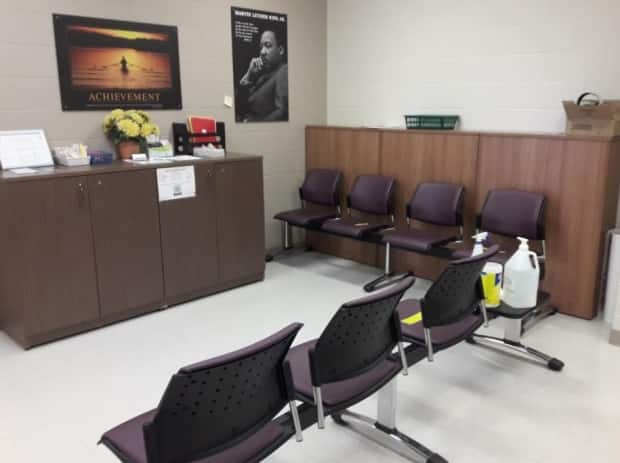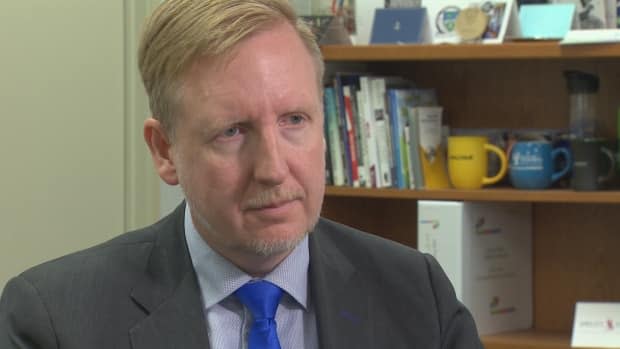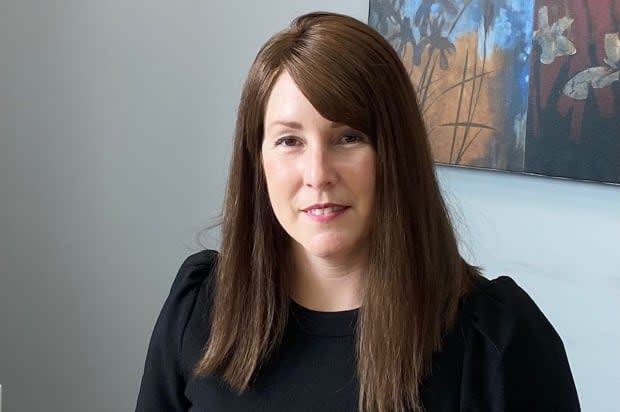Students try to support each other, while half of school psychologist positions sit vacant

Grade 11 student Shirley Joubert knows what it's like to ask for help and not be able to find it.
She has suffered from depression and anxiety. With no psychologists at Moncton High School to talk to, Joubert started doing research on her own to find ways to feel better.
"I found it really hard to be able to get help for my own struggles," she said. "And the more I looked into it, the more I realized that my friends had the same struggles and not even just my friends, but like a big portion of my school … is struggling with mental health issues, especially anxiety and depression."
Ideally, Joubert would like two full-time psychologists assigned to Moncton High School's 1,300 students.
In New Brunswick, there are 76 full-time school psychologist positions, but Education Minister Dominic Cardy said at last count only 39 were filled, leaving nearly half of the positions vacant.
A lot of the structures that we've had in place for a long time are clearly getting creaky. - Dominic Cardy, education minister
Cardy's department has been trying to "reach out to school psychologists," but he said it's clear to him that the system isn't working and it's time to find new ways of doing things.
"A lot of the structures that we've had in place for a long time are clearly getting creaky," he said.
"The only way we can really judge whether those services are effective is if they help the people they're supposed to help, and we're talking about kids here with mental health challenges and they're not getting those supports."
Cardy and the College of Psychologists continue to disagree about new legislation that would allow some teachers to assess students and develop personalized learning plans, and students continue to struggle to find the help they need in schools.
Students 'lack hope'
As part of her independent study course this semester, Joubert decided to take a closer look at what she could do to improve access to mental health support.
The only option for many of her classmates is to talk to one of Moncton High's four guidance counsellors, but it is difficult to get an appointment, and in her experience the help they can provide is limited.
"The mental health resources that they can give out are mostly just limited to a few websites and some deep-breathing exercises," Joubert said.
The Department of Education website specifies that school counsellors require a master's degree with graduate level courses in counselling theory and ethics in addition to four additional counselling or career development courses.
Heather Gunn, a longtime teacher at Moncton High, said while everyone is doing their best, the challenges students at her large high school face are many, and the resources are few.

She points to the most recent wellness survey data, which shows about 40 per cent of students at her school are living below the poverty line, 41 per cent have experienced anxiety, and another 47 per cent have experienced depression.
"I would say the biggest thing that they articulate to me is that they don't feel empowered," Gunn said of her students. "What they're feeling is they're kind of moving pieces and they're never asked — you know kids are saying, 'I just want to be asked, I just want to be part of the solution, we can be trusted with that.'"
She believes that some of the rising mental health problems could be alleviated by giving students the opportunity to weigh in on the problems they face and feel a "sense of power."
In her class, Gunn encourages her students to find projects they can do on their own and to have influence where they can.
"I would say they lack hope, a lot of them. And I know it's really hard to say, but that's that's what I would say. And when you don't feel hopeful or empowered, I think that that maybe explains a lot of the depression."
New 'chill room' set to open
While Joubert can't solve the problem on her own, she has brainstormed with classmates and teachers and come up with some ideas she hopes will improve the school environment for others who are struggling.
She has received a grant of $1,500 through a government of Canada-funded organization called Rising Youth to turn the guidance waiting room into a place where students can go to relax "if they're having a panic attack or some other form of episode," she said.

"I really wanted to create a safe space for students to just go and calm down if they need."
Her plan is to paint the room blue, a calming colour, and furnish it with some bean bag chairs, lots of plants, and a coffee table that will have some stress busting items like colouring books, and pamphlets with information for students who need help.
Course aims to help students support each other
Joubert is also creating a course for students and staff at Moncton High that will educate everyone on mental health issues and how they can support each other.
"A lot of that is going to be learning about self care and just general wellness."

She said there are many students at her school who are neurodiverse or different in some way, and if there aren't any psychologists available to help them, there should at least be support from their peers.
"There are a number of students who are really, really mean to the autistic kids and it just rubs me the wrong way," she said.
"There's a lot of really horrible things that students still say and do … we have a very racially diverse population in the school and there are a lot of students who make racially charged jokes. And then if you try and combat them, then they'll just be like, 'It's just a joke.'
"But it really isn't. It's incredibly hurtful to a lot of people."
Joubert believes education is one part of the solution, and giving students resources and a place to escape is another.
"I think it could definitely help — not fix the whole issue — because obviously there's a lot to unpack here. But I think it would definitely go a step further towards helping us reach the goals we need to reach."
Cardy says psychologists for every school not in the plan
When asked if he could see a future where psychologists would be assigned to every school, Cardy was blunt.
"Psychologists in every school — I cannot see that," he said.

Instead, he detailed a plan that includes $1 million to support programs in schools that will offer basic mental health training to all adults in the education system.
"So everything from classroom teachers all the way up to the school psychologists, we're working to try and create a more integrated approach," he said.
The new approach has been piloted, Cardy said, with success at schools that have offered the training to everyone, including custodians and bus drivers.
"It's a more flexible approach that we really need, especially when we've got professional associations being somewhat protectionist in the way they use their skills and expertise, that we've got to find a way to support our kids in the meantime."

Mandy McLean, executive director of the New Brunswick College of Psychologists, said the shortage of school psychologists has been a problem for at least a decade, and it's now reached the point where those who are working are "definitely overwhelmed."
"It really comes down to the working conditions within the public sector and especially within the school system. Salary parity among Atlantic provinces is the top issue."
She hopes current negotiations will result in a collective agreement that will close the salary gap with neighbouring Nova Scotia, where her members can earn as much as $30,000 more per year and have their summers off.
McLean added that her members are open to collaborating with other professionals.
"Some of the mental health concerns don't need to be seen or dealt with by a psychologist. They could be dealt with by other health-care professionals," she said. "It really does come down to wanting to function in the best interest of the kids."

While the battle between Cardy and school psychologists continues to simmer, Joubert is focused on completing the new space at Moncton High for students and on her new mental health course.
"I've got a lot of friends telling me that they're really happy about what I'm doing," she said of her efforts to support fellow students. "And I've had some people just, like, walk up to me and tell me that they're really excited for the project, which is nice.
"It's a real problem. And I'm hoping that my project helps tackle it."

